
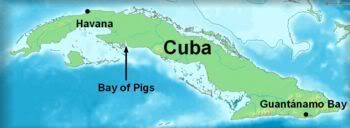
Bay of Pigs Invasion, 1961, an unsuccessful invasion of Cuba by Cuban exiles, supported by the U.S. government. On Apr. 17, 1961, an armed force of about 1,500 Cuban exiles landed in the Bahía de Cochinos (Bay of Pigs) on the south coast of Cuba. Trained since May, 1960, in Guatemala by members of the Central Intelligence Agency (CIA) with the approval of the Eisenhower administration, and supplied with arms by the U.S. government, the rebels intended to foment an insurrection in Cuba and overthrow the Communist regime of Fidel Castro. The Cuban army easily defeated the rebels and by Apr. 20, most were either killed or captured. The invasion provoked anti-U.S. demonstrations in Latin America and Europe and further embittered U.S.-Cuban relations. Poorly planned and executed, the invasion subjected President Kennedy to severe criticism at home. Cuban exile leader José Miró Cardona, president of the U.S.-based National Revolutionary Council, blamed the failure on the CIA and the refusal of Kennedy to authorize air cover for the invasion force, but perhaps more crucial was the fact that the uprising the exiles hoped and needed to spark did not happened. Much later it was revealed that the CIA task force planning the invasion had predicted that the invasion's goals unachievable without U.S. military involvement; it is unclear whether Kennedy or CIA chief Allen Dulles knew of the assessment. In Dec., 1962, Castro released 1,113 captured rebels in exchange for $53 million in food and medicine raised by private donations in the United States.
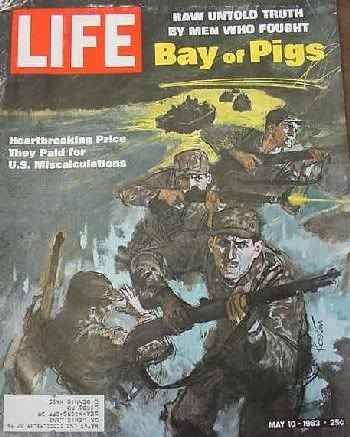
BAY OF PIGS REVISITED: Lessons from a Failure
http://www.time.com/time/magazine/article/0,9171,834040,00.html?promoid=googlep
Bay of Pigs Part 1
Bay of Pigs - Part 2 - Invasion
Allen Welsh Dulles (April 7, 1893 – January 29, 1969)
http://en.wikipedia.org/wiki/Allen_Dulles

The Bay of Pigs Invasion
http://www.cyberessays.com/History/37.htm
Forty Six Years After the Bay of Pigs Tragedy
http://www.diariolasamericas.com/news.php?nid=26878
Forty-six years ago, an event took place that was disastrous for Cuba’s liberty, for the prestige of the United States of America, and for the fate of democracy in the world, especially in the Western Hemisphere. On April 17, 1961, the Assault Brigade 2506, formed by Cuban patriots that landed in the area known as Bay of Pigs or Girón Beach, did what it had agreed upon with the U.S. government to rescue their homeland from the clutches of communism that has been entrenched there mercilessly since January 1, 1959. Unfortunately, Washington made the very serious mistake –actually, there were many mistakes—of not fulfilling what it had promised and failed to give air cover to the landing. Because of this, the Brigade was defeated.
Among the many mistakes made by the Washington government was changing at the last minute, secretly, the landing site unbeknownst to the Cubans who were going to challenge with their lives and their patriotism the Fidel Castro communist hordes. The original plan to land near a mountainous area was changed suddenly, although this does not imply that Washington had made this decision impulsively, failing to inform their Cuban allies. To this must be added what we already said that there was no air cover, which was indispensable for that military operation.
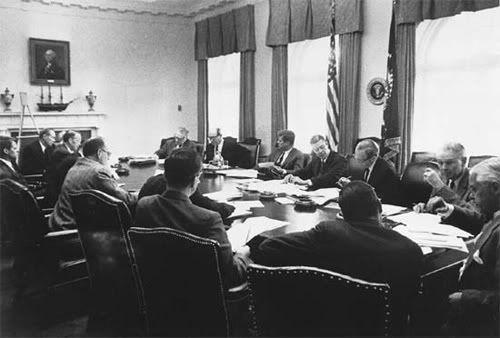
The American government not only failed the Cuban patriots, it also failed its own country. The United States has paid dearly, very dearly for this huge mistake, not only because of the thousands of millions of dollars that the tragedy of the Cuban people has cost, but also because as a result many other countries in the world have suffered what the fall of Cuba under the clutches of the Soviet Union represented. Nowadays, with no more Soviet Union, the influence of the totalitarian tyranny of Fidel Castro still has terrible effects. Without the Castro tyranny, today there would not be the type of government that is installed in Venezuela with its ramifications in Central America and other Latin American countries and its ties with the distant and menacing Iran.
DIARIO LAS AMERICAS, which forty-six years ago informed on a daily basis what was happening, deeply regrets the terrible mistake made by the John F. Kennedy Administration, and reiterates its admiration and respect for the patriots who risked their lives on the bloody sands at Bay of Pigs. Likewise, it expresses its wishes that the fatherland of José ...
Martí soon may recover the freedom that it lost on January 1st. 1959.
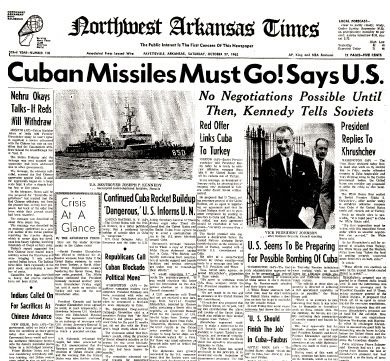
Palm Beach County Bay of Pigs veterans remember invasion of Cuba
http://www.sun-sentinel.com/news/local/palmbeach/sfl-pbrigademar26,0,5880251.story?coll=sfla-news-palm
Each year in mid-April, a group of former Cold War warriors gathers for a somber anniversary at the Cuban American Club west of West Palm Beach. There, veterans of the 1961 Bay of Pigs observe a minute of silence in memory of their fallen comrades in the failed attempt to topple Cuban President Fidel Castro.
Members of the Association of Veterans Bay of Pigs Brigade 2506 then sing the national anthem, followed by the anthems of Cuba and the brigade. Wives and daughters of the brigadistas, as they are known, place a floral arrangement next to the bust of Cuban patriot Jos– Mart– in the club's parking lot. Someone leads the group in prayer
Afterward, they share combat stories, most likely told many times before. But the ceremony doesn't ease the longing for a Cuba free of Fidel Castro. Each anniversary, the remaining brigade members in Palm Beach County drive home still waiting for the day democracy will return to their motherland.
"We have a bottle of Dom P–rignon that we will uncork the day Castro, the master of deceit, dies," said Francisco Montiel, 72, who took part in the invasion on April 17 almost 46 years ago.
"I've been waiting 47 years," he said, referring to his years in exile.
In the late 1950s, Montiel fought with Castro's brother, Raul, to oust Fulgencio Batista, who led the country from 1952 to 1959 after staging a coup d'etat. He thought Castro would restore democracy in 1959, but instead, Castro installed a communist government. Montiel, who lives in Lake Worth, fled Cuba a year later. In the United States he joined the CIA-backed effort to overthrow Castro.
Of almost 1,500 brigade members who landed in Playa Giron almost 50 years ago, half have died, said Juan Torre Mena, the keeper of the brigade's headquarters in Miami. The celebration in Palm Beach County is scheduled for April 15 this year, with a larger ceremony on April 17 at the brigade's headquarters -- an old house in Miami that serves as a Bay of Pigs museum, the brigade's office and a temporary mausoleum for the ashes of veterans. Eighteen brigadistas remain in Palm Beach County. Montiel is the brigade's Palm Beach County delegate.
Castro's illness and the temporary transfer of power to Raul Castro came as a ray of hope to this group.
The aged brigade members are still fighting against Castro's government, but less aggressively, said Emilio Herrero, 64, of Boca Raton.
They buy prepaid phone cards and send them to people in the resistance on the island, Herrero said.
"Sometimes, it is useless because Castro's people infiltrated the resistance and the phone cards never make it to the right hands," he said. "But we do what we can."
Some of the oldest brigade members wished they could do more.
"If somebody hands me a rifle, I am going to fight," said Gualdo Carmona, 83, of West Palm Beach.
Brigade 2506 was part of an operation the Central Intelligence Agency sponsored to bring down Castro. The CIA recruited Cubans exiled in the United States in 1960 and created a paramilitary force to penetrate Cuba, and organize and train resistance groups. The clandestine operation ended with the invasion on April 17 and the brigade's defeat and capture by Castro's forces two days later.
The CIA years ago declassified documents unveiling its involvement but never considered the Cuban recruits as CIA officers.
Miguel Reyes, 69, of Lake Worth, helps keep the spirit of the brigade alive in Palm Beach County, Bay of Pigs veterans said. In the late 1970s, he bought a property on Pike Road and turned it into the Club Cubano Americano, or the Cuban American Club. Many veterans here gravitate to the remodeled, post-World War II ranch-style house tucked in an industrial neighborhood west of Florida's Turnpike. Club members are mostly Cubans, but people from other nationalities are welcome to join, Reyes said. Black-and-white pictures of Mart– and the founders of the Republic of Cuba decorate the walls of a tired-looking lobby. A dining room with a bar sits across a hall from a small ballroom.
Time may have blurred the veterans' memories of places they visited in Cuba as young men, but it hasn't dimmed their hopes.
At the club on a recent Sunday afternoon, Montiel, Reyes and brigade member Armando Basulto couldn't agree on the name of a monument featured in a picture hanging on a wall in the dining room.
"That's the [former Cuban president] Maximo Gomez Monument in La Havana," Reyes said.
"No, chico," Basulto, 65, said. "That's not it."
After a brief back and forth the debate dissipated without resolution.
Basulto, who lives in Port St. Lucie and Miami, already planned what he would do when Castro dies. He hopes to move to Cuba and offer advice if a transitional government would be established to help prepare for the first democratic elections in more than 50 years, he said. The Communist Party is now the only political party.
"About 80 percent of the population grew up with Castro," he said. "The people will need to learn what democracy and elections are."
Montiel can't wait to go back.
"I have no hatred," he said. "I want to see our royal palms again, feel the wind, walk on our beaches ... hear the beats of our marimbas."
For Herrero, moving back to Cuba is almost impossible. He resents the damage done to his country and the friends he saw killed in the Bay of Pigs.
"But I would like to visit and help with its reconstruction," he said.
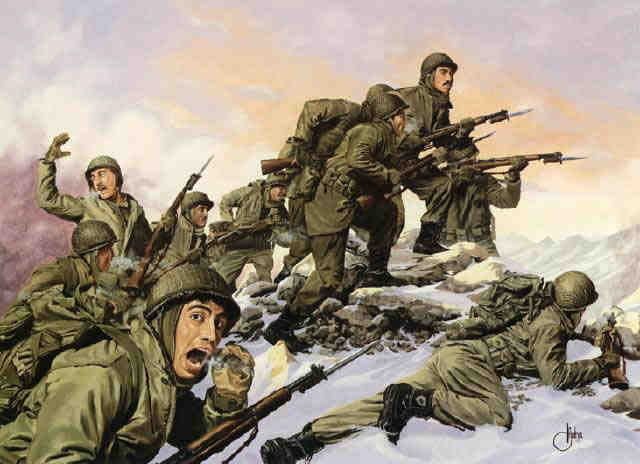












![Brotherhood" (2006) [TV-Series]](http://photos1.blogger.com/x/blogger2/1421/379621144723082/211/z/425926/gse_multipart33129.jpg)







No comments:
Post a Comment